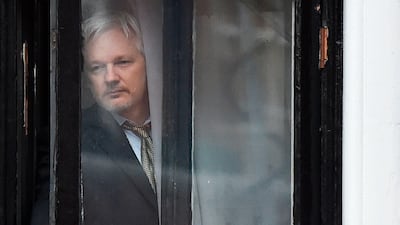Ecuador used part of a $5 million secret intelligence budget to monitor the visitors of Julian Assange while he has been holed up in its London embassy, according to reports.
Documents obtained by the Guardian newspaper suggest that Ecuador spent an average of $66,000 a month to protect the high-profile fugitive and WikiLeaks founder in a project known as “Operation Guest”.
The operation had the approval of then Ecuadorian president Rafael Correa, according to the newspaper, but has since been wound up as the relationship soured between Mr Assange and a new government that came to power last year.
Mr Assange has been at the embassy since June 2012 to avoid facing allegations of sexual assaults in Sweden and potential extradition to the United States over the release of classified documents by WikiLeaks about US military operations in Iraq and Afghanistan.
The reputed Ecuadorean operation included monitoring all of his visitors, secretly filming the comings and goings at the embassy in the upmarket London district of Knightsbridge, employing international security contractors to carry ou the work, and considering a media strategy to improve his image, it said.
The project began as an attempt to protect him from being arrested, while considering ways he could be whisked out of the country, which was under consideration before the relationship deteriorated. British police have also spent millions of pounds monitoring the embassy over the last six years to prevent him from escaping the embassy.
_______________
Read more:
Ecuador cuts off Assange's communications from its London embassy
Assange's arrest warrant upheld by UK judge
_______________
Mr Assange has been visited by people including lawyers, US rights campaigner Jesse Jackson, the former Baywatch actress Pamela Anderson and Brexit-backing UK politician Nigel Farage during his time inside the embassy.
Some of those who visited Mr Assange responded angrily yesterday after learning they were allegedly targeted by a state sponsored spying operation.
“If just visiting someone and talking to a friend under arbitrary detention…. then we are really heading to the abyss as a liberal society,” wrote human rights lawyer Renata Avila in a tweet.
News of the apparent spying operation comes as Mr Assange comes under pressure from the current Ecuadorian government, headed by president Lenin Moreno, who wants Mr Assange out as part of efforts to improve ties with the United States.
The leader has also shut down the intelligence agency responsible for the spying operation in London. Mr Assange has been denied access to the Internet and the authorities have installed a jamming device to stop him from using nearby wifi signals. The stream of visitors has also dwindled with only his legal team allowed over the threshold.
The administration of Donald Trump – who once declared his love for WikiLeaks on the campaign trial - has stepped up efforts to put Mr Assange on trial in the US, where he could face decades in jail because of the leak of diplomatic cables and other classified material in 2010.
Sweden dropped its sexual offence inquiry last year but if Mr Assange leaves the embassy, he is likely to be detained for skipping bail by British police – who have maintained a covert presence in the area. The US is expected to seek his extradition if he is held in custody in the UK.
Mr Assange was made an Ecuadorean citizen last year and the South American nation unsuccessfully sought to register him as a diplomat to give him immunity from arrest.
Despite Mr Assange’s restricted movements and health problems associated with his confinement, Mr Assange has remained at the centre of global controversies over the activities of WikiLeaks.
The website released emails connected to Hillary Clinton’s 2016 run for the presidency that the Democratic party says was designed to damage her chances.
The newspaper cited documents that suggested Mr Assange managed to compromise the embassy’s communications system and hack into staff emails as relations between country and guest deteriorated. WikiLeaks denied the claim in a tweet and said it would sue the newspaper, which once worked as a collaborator in WikiLeaks document dumps. “You’ve gone too far this time,” it said.
The embassy referred queries to the foreign ministry in Ecuador. The ministry declined to comment saying the operation “happened before we took office”.

